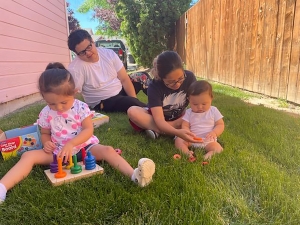Building the Foundation to Thrive
Three years after its founding, YVPE’s organizations and individuals are working together to help students – and have early results to show for it.
Aligning resources and people, and prioritizing meeting students’ needs, Yakima Valley Partners in Education (YVPE) has made significant progress toward improving educational outcomes for the children of the Yakima Valley.
“Through community listening sessions, we identified the educational challenges students face and formed groups of professionals and community members who wanted to address these,” said Suzy Diaz, Heritage’s Collective Impact director for YVPE.
Significantly, said Diaz, three of the Valley’s school districts – Sunnyside, Mabton and Grandview – are working collaboratively on their shared concerns for their students, their futures and the related well-being of the community. YVPE plans to include other school districts as the work progresses and funding is made available.
“We’ve seen school districts willing to collaborate cross-sectors to solve challenges to benefit students.”
Children entering school arrive with varying reading abilities, home lives that may impact attendance, food insecurity, health needs, transportation challenges, even homelessness.
“Teachers dedicate themselves to teaching and do a wonderful job, but students carry so much with them as they enter the classroom.”
The challenges faced by students impact achievement rates in the Valley. According to yakimavalleytrends.org, 20 percent of young people here fail to complete high school. College attainment rates are low, with only 8.2 percent of students getting two-year degree and 11.1 percent earning a four-year degree.
with only 8.2 percent of students getting two-year degree and 11.1 percent earning a four-year degree.
“One of our first goals is that children enter school kinder-ready, improving their chances to meet the educational milestones that follow and enter the workforce with increased success,” said Diaz.
FULL-TIME COORDINATORS MAKE PROGRESS
YVPE’s focus for the three school districts is on a significant milestone in a student’s future success: reading at or above grade level by third grade.
In its first year, YVPE members established the “Rural Accelerator Leadership Program” to positively address the varied issues affecting literacy achievement, especially in rural communities. Members include school district leaders, community members, and professionals from community- based organizations. Each works in one of four active workgroups: Health, Digital Connectivity, Partnerships and Resources, and Parent-Family Engagement.
Helping make reading to grade level by third grade a reality, a program called “Early Steps to School Success” was implemented in the Grandview School District in the 2019-20 academic year. It’s an early-learning support program run by Save the Children, one of YVPE’s founding partners and funders.
In addition, in a step Diaz calls “very significant for our goals,” place-based, full-time staff have been hired to coordinate early-learning family- support activities.
 Families were so eager to receive support from the early steps team that a waitlist was generated. Organizers are adding additional coordinators in Grandview, Mabton, and Sunnyside in 2022 to meet the demand for services.
Families were so eager to receive support from the early steps team that a waitlist was generated. Organizers are adding additional coordinators in Grandview, Mabton, and Sunnyside in 2022 to meet the demand for services.
The coordinators partner with parents to screen children for developmental progress using an evidence-based curriculum to ensure early- learning milestones are reached. When a need is identified, the coordinator connects the family to resources. Seventy children have been served to date; 10 percent of them have needed referrals for developmental services.
“If a child receives support early, they’ll be more likely to enter school kinder-ready,” said Diaz. “It’s an opportunity for a family to raise questions and get the needed school-based supports.”
HEALTH WORKGROUP
The Health workgroup focuses on increasing access to healthcare for families of students pre- school to third grade. The goal is to increase attendance by reducing health issues that keep students from attending school, thereby increasing students’ chances for achievement.
“Part of our work is trying to understand whether there are healthcare needs that aren’t being met that are a barrier to attendance or success in the classroom,” said Josie Chase, human resources director with Grandview School District and Health workgroup liaison.
“You have to get your information from families themselves to understand what’s happening at this moment in time. Maybe it’s the affordability of healthcare; maybe it’s a type of provider needed or undiagnosed conditions.
“When we understand and help meet their needs, and they’re in school, there’s a greater likelihood that children will be on pace to meet grade-level milestones.”
A YVPE community health fair served 250 families in fall 2021, providing free healthy food via a food truck, meetings with a mental health provider and emergency services, plus coordination for sports physicals, dental screenings, COVID vaccinations and school immunizations.
Families who completed attendance surveys received free food voucher. In total, 600 surveys were completed, giving the Health workgroup excellent data to help them develop student- centered strategies. More than 150 students have since been enrolled in free telehealth services.

Grandview Early Steps to School Success family; bonding and teaching the youngest members of the family through play
“When students are able to come to school every day, they’ll be on grade level,” said BJ Wilson, Grandview’s director of special education and a member of the Health workgroup.
“Removing barriers for students this young truly opens up their future.”
DIGITAL CONNECTIVITY WORKGROUP
The pandemic has demonstrated the necessity of connectivity in our homes, said Jared Lind, director of instructional improvement and assessment for the Grandview School District and liaison for the Digital Connectivity workgroup.
“And it revealed early on the inequities that exist in our communities.”
Digital connectivity is all about making sure students are connected virtually to their schools, teachers and outside sources of information necessary for their education. This means equipment, wireless connection and ensuring users have the skills they need to use their devices.
“It’s also really important that our students are given the option to read what’s of interest to them.”
In 2020, Save The Children provided “MyOn Digital Library” subscriptions to every third grade student in Grandview, Mabton and Sunnyside, thus providing access to both fiction and nonfiction digital books. They have optional reading supports like narration options and language choices that allow them to connect further with what they’re reading.
“It makes reading that’s of interest for students available to them in their homes any time day or evening,” said Lind.
The long-term goal is to increase access for all grades. Ultimately all students will have access to more than 7,000 books.
“The MyOn system keeps track of students’ time spent reading so we can celebrate it,” said Lind. “We’re doing incentive programs with school librarians taking the lead on that.
“We’re seeing a change in reading habits and an increased joy in reading.”
PARTNERSHIPS AND RESOURCE ALIGNMENT WORKGROUP
Increasing alignment between food access, transportation and homelessness is the primary goal of the Partnerships and Resources Alignment workgroup.
Many challenges to education are related to one another, said Faviola Ochoa, lead associate for the State of Washington with the Early Childhood Program of Save the Children and liaison for this group.
“Food insecurity is a consequence of poverty as well as lack of transportation, especially for people in rural communities. Sometimes there are multiple issues so that family dynamics focus on just surviving. It doesn’t leave much time for the parent or caregiver to seek out resources for other things.
“It has to be about the long-term, so people know what’s available on an ongoing basis. We need to give them the tools to empower them, whether that’s sharing it online or laying out all the resources in flyers at resource events.”
The group has also organized the distribution of staple items directly to schools during parent nights and drive-through events, literally “meeting people where they are.” Local grocers and food banks partnered with YVPE to provide families with gift cards purchased with funds collected from nonprofit organizations, allowing families food choices and the freedom to shop at their convenience.
“Normally, families have to go to the school for one thing and then the food bank,” said Ochoa. “This is about integrating multiple things at once to minimize the transactional busyness families are often up against.”
PARENT AND FAMILY ENGAGEMENT WORKGROUP
The Parent and Family Engagement group has acknowledged the importance of involvement beyond attendance at parent-teacher conferences and open houses. “Parental involvement” must reflect the lived experience, i.e., what makes sense for families in the reality of their actual lives, said Gloria Jones-Dance, assistant professor of teacher preparation at Heritage.
“Family engagement is making sure your kids get to school every day, making sure they have housing, making sure they have food, making sure your kids get to bed so they can be ready for school,” said Jones-Dance. “Parents need to be able to interact with teachers and school staff outside the traditional 8 to 5. How that will look is different for each community.”
Jones-Dance said her group has made a lot of inquiry and listening about what engagement means.
“I was talking with a Grandview parent who’s really involved in her kids’ lives. She said all many parents can do right now, as it relates to school, is drop their kids off. For them, that’s engagement right now.
“We are looking at ways to reach families outside of the schools, possibly some community events in parks this summer, read-aloud opportunities, how we can partner with schools and understand better the backgrounds of the families in these communities.”
INVITING ALL TO CONTRIBUTE
The work of getting all students to thrive in school requires everyone, said Diaz.
“Our true north is to invite people to improve educational outcomes by recognizing what they can contribute to the solutions. It’s a trusted adult picking up a book and reading with a child. It’s parents asking what their children are learning. It’s employers allowing flexibility so parents can be present for their children.”
Henry Strom, superintendent of the Grandview School District and a YVPE partner, wants more school districts to become involved.
While districts’ work has always overlapped, he said YVPE gives them the means to take that work to another level.
“In education, if a concept is solid, you look for other areas to implement it. We’re now seeing that includes superintendents.
“And imagine the potential for our region if we were all bold enough to bring the data to the table and function like our teachers do to improve student outcomes. That’s what we’ve started doing.
“We’re interested in all students in the Yakima Valley, and that means we are as concerned for other districts as we are for our own,” said José Rivera, Grandview’s assistant superintendent for teaching and learning and a YVPE collaborator. “With YVPE, we’re no longer siloed.”
Strom and Rivera say the holistic- helping approach of YVPE increases families’ trust levels. Parents see unified efforts that make a difference in their lives.
“The healthier the household, the healthier the community,” said Strom. “That’s really what we’re going for. We want students to want to come back and raise a family here, contribute to our region and our economy.
“I believe we all have a moral imperative to make our communities better. That means schools, businesses, people, all of us. No one’s going to come and save us, and we don’t need anyone to. We have expertise right here.
“My dad was a P.E. teacher and a coach, and he had a saying, ‘Create a place of being,’ meaning a place that kids want to come to.
“There’s great potential that the Yakima Valley can be that. You want a community that’s so strong that people come in droves to be part of it all. We can do that.”
Heritage University serves as the backbone for YVPE. Our mission is closely aligned with the purpose of this initiative, and as an institution of higher education, many of our alumni are working in the Yakima Valley. Additionally, one of our strategic priorities is community partnerships in which we extend our support to join with others to improve educational outcomes for the Valley.
